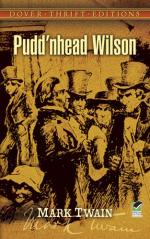The courthouse was crowded, of course, and would remain so to the finish, for not only in the town itself, but in the country for miles around, the trial was the one topic of conversation among the people. Mrs. Pratt, in deep mourning, and Tom with a weed on his hat, had seats near Pembroke Howard, the public prosecutor, and back of them sat a great array of friends of the family. The twins had but one friend present to keep their counsel in countenance, their poor old sorrowing landlady. She sat near Wilson, and looked her friendliest. In the “nigger corner” sat Chambers; also Roxy, with good clothes on, and her bill of sale in her pocket. It was her most precious possession, and she never parted with it, day or night. Tom had allowed her thirty-five dollars a month ever since he came into his property, and had said that he and she ought to be grateful to the twins for making them rich; but had roused such a temper in her by this speech that he did not repeat the argument afterward. She said the old judge had treated her child a thousand times better than he deserved, and had never done her an unkindness in his life; so she hated these outlandish devils for killing him, and shouldn’t ever sleep satisfied till she saw them hanged for it. She was here to watch the trial now, and was going to lift up just one “hooraw” over it if the county judge put her in jail a year for it. She gave her turbaned head a toss and said, “When dat verdic’ comes, I’s gwine to lif’ dat ROOF, now, I TELL you.”
Pembroke Howard briefly sketched the state’s case. He said he would show by a chain of circumstantial evidence without break or fault in it anywhere, that the principal prisoner at the bar committed the murder; that the motive was partly revenge, and partly a desire to take his own life out of jeopardy, and that his brother, by his presence, was a consenting accessory to the crime; a crime which was the basest known to the calendar of human misdeeds—assassination; that it was conceived by the blackest of hearts and consummated by the cowardliest of hands; a crime which had broken a loving sister’s heart, blighted the happiness of a young nephew who was as dear as a son, brought inconsolable grief to many friends, and sorrow and loss to the whole community. The utmost penalty of the outraged law would be exacted, and upon the accused, now present at the bar, that penalty would unquestionably be executed. He would reserve further remark until his closing speech.




